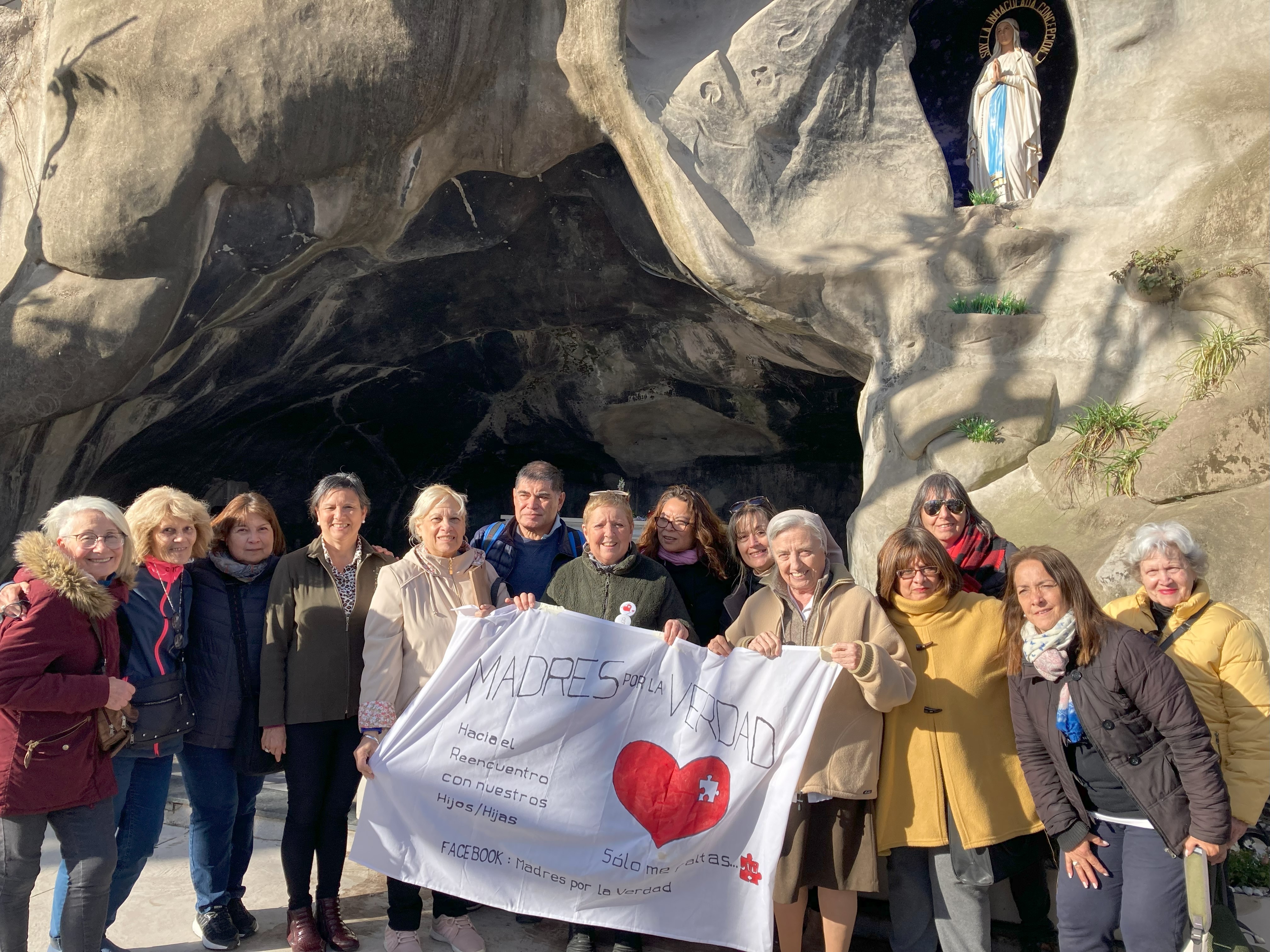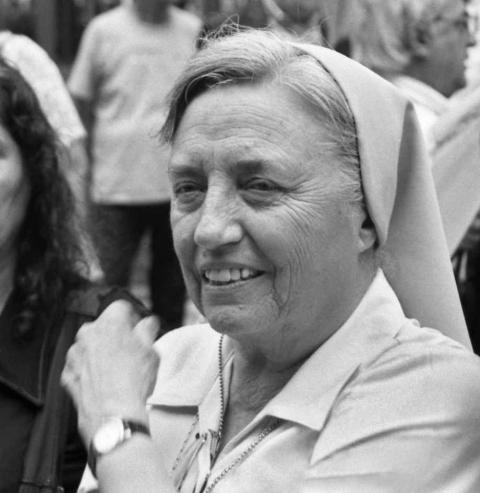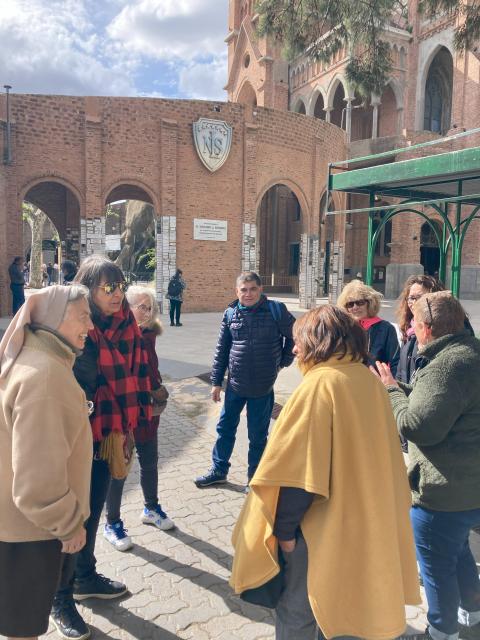
Meeting in the sanctuary of Lourdes, Church of Santos Lugares, Sr. Martha Pelloni gathers with the group, Mothers for Truth, who are searching for their children stolen at birth. (GSR photo/Catalina Cepparro)
Alicia Predazzi entered the delivery room at the clinic of Dr. Pedro Honaine in the town of San Martín, province of Buenos Aires, on Nov. 30, 1993. She was told that she was going to have a cesarean section, without any explanation, nor her obstetrician being present. They prepared her, gave her the epidural injection of anesthesia, and after a while she heard her baby crying.
But she was informed at the clinic that her son was stillborn.
"I couldn't believe it," Pedrazzi told Global Sisters Report. "My husband told me that the clinic was going to take care of everything, and that we didn't have to worry, but I didn't want to know anything. If my baby had died, I wanted to say goodbye and give him a holy burial," she added.
That same night, at the clinic, the dead body was brought to her, but Alicia's maternal instinct told her that the baby was not hers.
After years of bitterness and uncertainty, she was encouraged to write to a judge to order a DNA test on the body that the hospital had been responsible for burying. The compatibility result: negative. Despite this, she did not receive justice.
"I never found a lawyer to take my case," said Pedrazzi who, today at 66, is retired and lives in San Martín. "No one wanted to take my case, so I had to begin to investigate on my own."
Together, these women, who have formed the group Mothers for Truth, denounce the abduction of their children. The government, to date, has offered no answers or help in resolving their grief, the mothers told GSR.
After a decade of searching, Pedrazzi encountered Sr. Martha Pelloni, who convenes meetings every month in the Church of Santos Lugares in Buenos Aires to seek answers or to give support in desperate situations related to gender violence or human trafficking.
This is how Pedrazzi joined other mothers who experienced similar situations to hers in other clinics in the province, which the mothers say were also responsible for stealing their children at birth. Together, these women, who have formed the group Mothers for Truth, denounce the abduction of their children. The government, to date, has offered no answers or help in resolving their grief, the mothers told GSR. Pelloni encouraged her to bring her case to the Network for Stolen Children, with the intention of obtaining, for this group of mothers, the juridical and legal counsel that would permit their cases to be heard.
"She told me, 'Don't be afraid; I will continue to support you,' " Pedrazzi recalled.

"In Argentina it is very difficult to conduct investigations in order to achieve the truth and justice we seek," said Sr. Martha Pelloni, Teresian Carmelite. (Wikimedia Commons/Fedetamlian, CC BY-SA 4.0 deed)
Pelloni, a Teresian Carmelite, has been dedicated to fighting for the human rights of children and women who are victims of violence, abuse, and corruption for more than 30 years. Well-known in Argentina, Pelloni — now 82 years old — is in Buenos Aires and is coordinator of the Network for Stolen Children, which is composed of 34 centers located in different areas of the country that provide assistance, accompaniment and counseling to victims and their families.
Pelloni founded this network in 2009 because of the flood of requests that came to her from all parts of the country seeking help, due to her notoriety in society for channeling claims against the government apparatus, which she was trying to resolve from the province of Corrientes. At that time, the sister realized the magnitude and the need for professionals to collaborate with her work in order to respond to the demands of the community.
Since its creation, the Network for Stolen Children has sought to respond to the claims of forgotten groups in society that do not have the resources to bring cases of femicide, abuse, rape, and human trafficking to justice.
A network of containment and support
The centers of the Network for Stolen Children are composed of psychologists, lawyers, and social workers — most of them volunteers — who seek to assist in solving problems that generally require legal intervention. In each center there is a team coordinator who, in turn, works together with other organizations within each community, such as nongovernmental organizations, schools and other local institutions.
The network is supported by the church and recognized by Pope Francis, but was formed independent of the Congregation of the Teresian Carmelite Missionary Sisters to help people of all types, including those of different religious beliefs.
"We train people to know how to listen without interfering, and to record everything that has happened to the person without interrupting or judging," said Pelloni, who serves as general coordinator at the Lourdes Sanctuary in Santos Lugares, where she began her novitiate at the age of 22.
The Network for Stolen Children has attended to an average of 30 cases per year in each of the centers, always under the coordination of Pelloni.

One of Pelloni's monthly meetings with the community, held on the 11th of each month, where they celebrate Mass, learn about and discuss news of cases brought to justice (GSR photo/Catalina Cepparro)
"It is essential to not re-victimize the person who tells about a rape or abuse," said the sister, who clarified that the person who is received at the network's offices should be referred directly to the psychologist or lawyer so that they can file the corresponding report.
It is under this premise, according to Pelloni, that the Network for Stolen Children has attended to an average of 30 cases per year in each of the centers, always under the coordination of Pelloni. The victims, primarily women, are the ones who come forward to recount their experiences, which include family violence, abuse and trafficking.
Fifteen years ago, Pelloni created the first of the network's centers in the city of Goya, in Corrientes, a province where poverty today is nearly half the population. At the time, the sister was the principal of Santa Teresa de Jesús School, run by the Teresian Carmelite Missionary Sisters.
"We have had very satisfying cases, because of their resolution — but not less distressing — such as the prostitution of some underage children in orgies prepared by the government authorities themselves," Pelloni said.
The Goya center is currently coordinated by Marta Almada, a retired teacher, who has a shelter donated by the municipality, where she primarily receives women victims of domestic violence and other types of abuse.
'It is essential to not re-victimize the person who tells about a rape or abuse.'
—Sr. Martha Pelloni
"Unfortunately, in Goya there is a lot of poverty, which results in us receiving cases such as young girls under 8 years of age who have been raped by their relatives, whom we have helped to leave those environments and have their babies," Almada explained. According to the center's records, some 47 cases related to intrafamilial problems have been attended to so far this year.
Among the principal difficulties in their work, the first thing Pelloni highlights is the lack of formation in human values, which she defines as "the greatest poverty," and is the reason the network organized itself to provide not only psychological help to vulnerable people, but also accompaniment to families who lack it.
"Unfortunately, values of formation have greatly declined," the sister said, adding that "there are mothers who even sell their children for pornography and pedophilia because of the great poverty in which they are immersed. We see that the lack of human formation is very great."
The second problem Pelloni mentioned is corruption at different levels of government; this hinders their work and forces the network to wallpaper the cities with posters, and to call for marches to demand justice.
"Many times, in the case of human trafficking, when mothers report the disappearance of their daughters to the police, instead of starting the search, the police tell them that they must have gone with the boyfriend. But mothers know that there are people of power involved," Pelloni said. "Brothels are in every city, and the police are paid to protect them."
An example of this was made visible in 2021 when a 5-year-old girl, named Guadalupe, disappeared in the middle of a family celebration. Three years after the case, there is still no information about her whereabouts. Pelloni was one of the voices denouncing the government's cover-up.
"The experience of many of us who have been working for a long time on cases of trafficking of children and adolescents, women who are sexually exploited, trafficking of organs, drugs, etc., enables us to verify that, in Argentina, it is very difficult to conduct investigations in order to achieve the truth and justice we seek," Pelloni wrote in a 2021 public letter.
Sowing light, justice and truth
How do the people who work in the Network for Stolen Children maintain their strength and support people? What skills did they have to learn in order to carry out their work?
"The first thing I had to learn is to remain calm, and not get nervous when there are cases that burn my hands, and I feel that something must be done urgently," Pelloni said. "I learned to be calm so that I can give strength to my teams, and to the groups. As general coordinator of the centers, I have to be the one who encourages, who searches and points the way, so that everything we do is done with hope, a lot of love, and accompaniment."
The victims, primarily women, are the ones who come forward to recount their experiences, which include family violence, abuse and trafficking.
Pelloni learned that the first step is always to accompany and to feel accompanied.
"We must make the person feel that she is not alone, and that she is not the only one in this situation. We must help her believe that everything has a solution when she works well, when she is listened to, and when she believes in the tools you are placing in her hands."
This story was originally published in Spanish Feb. 5.













